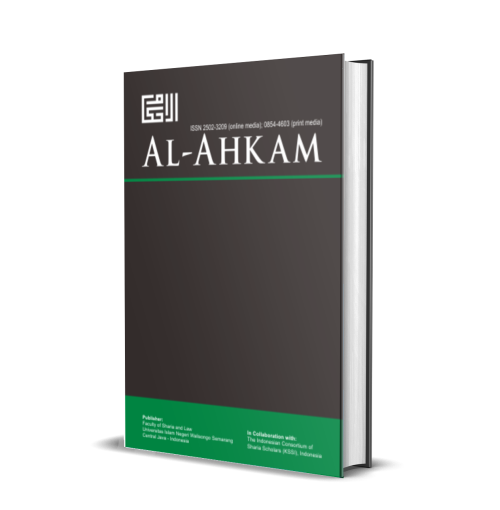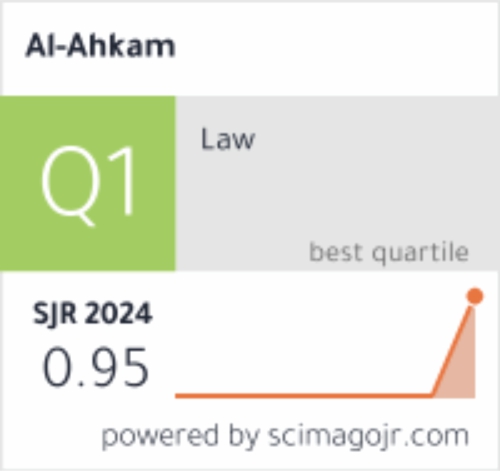Hajj Financial Management in the Maqāṣid Sharī’ah Perspective
DOI:
https://doi.org/10.21580/ahkam.2019.29.2.3893Keywords:
BPKH, hajj fund, maqāṣid al-sharī’ah, Strategic Assumption Surfacing and Testing (SAST)Abstract
This paper analyzes the management of the pilgrimage fund to the concept of Islamic wealth management and the management of the pilgrimage fund and its compliance with the maqāṣid al-sharī'ah. The first is done by analyzing the management of hajj funds by BPKH on the management of Islamic wealth. The second is done through interviews with academics, regulators, experts and practitioners. Descriptive processing is done through Strategic Assumption Surfacing and Testing (SAST). The analysis is done by selecting the 'important' and 'definite' variables. The results showed that the determinants of Hajj fund management according to Islamic wealth management were contracts, zakat and transparency. Hajj fund management policies for the protection of religion, including the setting of a fair and transparent haj quota, building infrastructure facilities for the pilgrimage, ensuring terms and conditions Life protection through the use of halal vaccines, providing and funding Hajj monitors, improving catering, lodging, transportation and health services and providing congregational data to the Ministry of Health. Protection of reason through improving the quality of rituals. Protection of assets through transparency in the management of hajj funds, direct investment in harmony with sharia, and management of hajj funds in Islamic banking.
Downloads
References
‘Ashūr, Muḥammad Ṭāhir Ibn. Maqāṣid Al-Sharī’ah Al-Islāmiyyah. Qatar: al-Syaikh Muḥammad bin Khalīfah al-Asanī, 2004.
A., Abimanyu. ‘Pengelolaan Dana Haji Dulu, Sekarang Dan Masa Depan’. Realita Haji. Jakarta, 2014.
Agoga. ‘Wawancara’, 2016.
Ahmad, Khaliq, Mustafa Omar Mohammed, and Dzuljastri Abdul Razak. ‘Case of Pilgrimage Funds Management Board (Lembaga Urusan Tabung Haji)’. IIUM Journal of Case Studies in Management 3, no. 2 (2012): 17–31. https://doi.org/10.1142/9789814508988.
Al-Fāsī, ‘Alal. Maqāṣid Al-Sharī’ah Al-Islāmiyyah Wa Makārimuhā. 5th ed. Rabat: Dār al-Gharb al-Islāmī, 1993.
Al-Ghazālī, Abū Ḥāmid Muḥammad ibn Muḥammad. Al-Mustashfā Min Ilm Al Ushūl. Beirut: Dar Ihyā at-Turāts al-Ᾱrabi, n.d.
Al-Khīn, Muṣṭafā, Muṣṭafā Al-Bughā, and ‘Alī Al-Sharjabī. Al-Fiqh Al-Manhajī ‘Alā Madhhab Al-Imām Al-Shāfi’ī. 4th ed. Damaskus: Dār al-Qalam, 1996.
Al-Zuhaylī, Wahbah. Al-Fiqh Al-Islāmī Wa Adillatuh. 2nd ed. Damaskus: Dār al-Fikr al-’Arabī, 1985.
Bashnafar, Sa’īd ‘Abd al-Qādir. Al-Mughnī Fī Fiqh Al-Ḥaj Wa Al-’Umrah. Jeddah: Maktabah Al-’Ilm, 1993.
Buang, Ahmad Hidayat. ‘Appreciation Of Syari’ah Principles In Property Management In Contemporary Malaysia Society’. Shariah Journal 16 (2008): 555–66.
Bunyamin. ‘Wawancara’, 2016.
DSN-MUI. Fatwa DSN-MUI No.122/DSN-MUI/II/2018 Tentang Pengelolaan Dana BPIH dan BPIH Khusus Berdasarkan Prinsip Syariah, Pub. L. No. 122/DSN-MUI/II/2018, 1 (2018).
Firdaus, Achmad. Maslahah Performa: Sistem Kinerja Untuk Mewujudkan Organisasi Berkemaslahatan. Yogyakarta: Deepublish, 2014.
Firdaus, Achmad, and Nurizal Ismail. ‘Using Maslahah Performa As An Islamic Wealth Management System’. In Thematic Workshop on Al-Mal: Philosophy and Its Application in Islamic Perspective, UKM-IRTI, Institute of Islamic Training Malaysia (ILIM), 1–13. Selangor, 2014.
Haji, Tabung. ‘5 Years Data & Statistics’. Malaysia, 2019.
Indonesia, Kementerian Agama Republik. ‘Laporan Keuangan Penyelenggaraan Ibadah Haji Tahun 2013’, 2014.
IPHI. ‘Pelaksanaan Haji Indonesia’. In Forum ‘IJjtima’ Ulama Komisi Fatwa Se-Indonesia IV’ MUI 2012, 1–14, 2012.
Ishak, Mohd. Shuhaimi. ‘Tabung Haji as an Islamic Financial Institution for Sustainable Economic Development’. In 2011 2nd International Conference on Humanities, Historical and Social Sciences IPEDR vol.17, 236–40, 2011.
Ismail, Nurizal. Maqashid Syariah dalam Ekonomi Islam. Yogyakarta: Smart WR, 2014.
Kementerian Agama Republik Indonesia. ‘Laporan Evaluasi Penyelenggaraan Ibadah Haji 2013’, 2013.
Masrifah, Atika Rukminastiti, and Achmad Firdaus. ‘The Framework Of Maslahah Performa as Wealth Management System and Its Implication for Public Policy Objectives’. Media Syariah 18, no. 2 (2016).
MUI. Fatwa MUI No 6 Tahun 2010 (2010).
Munawwir, A.W., and Muhammad Fairuz. Kamus Al-Munawwir Indonesia-Arab Terlengkap. Pustaka Progressif, n.d.
Sābiq, Al-Sayyid. Fiqh Al-Sunnah. Kairo: Al-Fatḥ li al-I’lām al-’Arabī, n.d.
Shafii, Zurina, Zarinah Yusoff, and Shahizan Md Noh. Islamic Financial Planning and Wealth Management. Kuala Lumpur: IBFIM, 2013.
Subadi. ‘Implementasi Kebijakan Pelayanan Haji Pada Kantor Kementerian Agama Kabupaten Bintan Provinsi Kepulauan Riau’, 2013.
Sulistyowati. ‘Wawancara’, 2016.
Suratman. ‘Wawancara’, 2016.
Zahrah, Muḥammad Abū. Uṣūl Al-Fiqh. Kairo: Dār al-Fikr al-’Arabī, n.d.
Downloads
Published
How to Cite
Issue
Section
License
By submitting an article to the journal, the author(s) agree to transfer the published article's copyright to the journal, which will act as the publisher. This means the journal will have the right to publish the article in various forms, including reprints. The journal will maintain the publishing rights to the published articles.
In line with the license, authors and third parties (readers, researchers, and others) are allowed to share and adapt the material. In addition, the material must be given appropriate credit, provided with a link to the license, and indicated if changes were made. If authors remix, transform or build upon the material, authors must distribute their contributions under the same license as the original.




